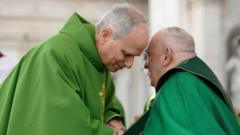The recent conclave has concluded with the swift election of Cardinal Robert Prevost, a move that many voting cardinals seem to believe is crucial for addressing the mounting challenges the Catholic Church faces today. The quick decision was driven by a consensus around two guiding principles: "continuity" and "unity."
There's a palpable recognition of the groundwork laid by Pope Francis, who reached out to marginalized populations and engaged with those beyond traditional Catholic borders. His efforts were greatly appreciated, particularly his advocacy for the voiceless and the poor—communities often sidelined by broader societal discussions. Nevertheless, there is an acknowledgment that significant work remains to bridge the divides within the Church, often framed as traditionalist versus progressive ideologies.
Within this context, Prevost's name emerged as a leading candidate. His strong support for Pope Francis coupled with an ability to appeal to different factions marks him as a candidate who can unify rather than divide. The voting cardinals approached the election with a dual consideration of the Church's needs and those of humanity at large, especially during these trying times marked by conflict and division.
Cardinal Prevost’s background as a dual national of the US and Peru positions him uniquely to resonate with both Latin American and North American constituencies, allowing him to connect disparate worlds within the Church. Prevost's ability to transcend cultural divides may be vital, especially as Pope Francis sometimes faced criticism for his perceived disconnect with American allies on critical issues like migration, climate, and social inequality.
In his first address from St. Peter's balcony, now Pope Leo XIV, articulated his vision of "building bridges" and fostering a sense of global unity, themes that resonate with Pope Francis’s legacy. As Prevost embarks on his papacy, he can expect his record and views to be examined thoroughly, particularly regarding crucial social issues and the Church's past scandals.
Despite the challenges ahead, the conducive environment created by a decisive election signals a strong foundation for his leadership. The cardinals have bestowed a robust mandate upon him as he embarks on this significant journey leading the Catholic Church.


















